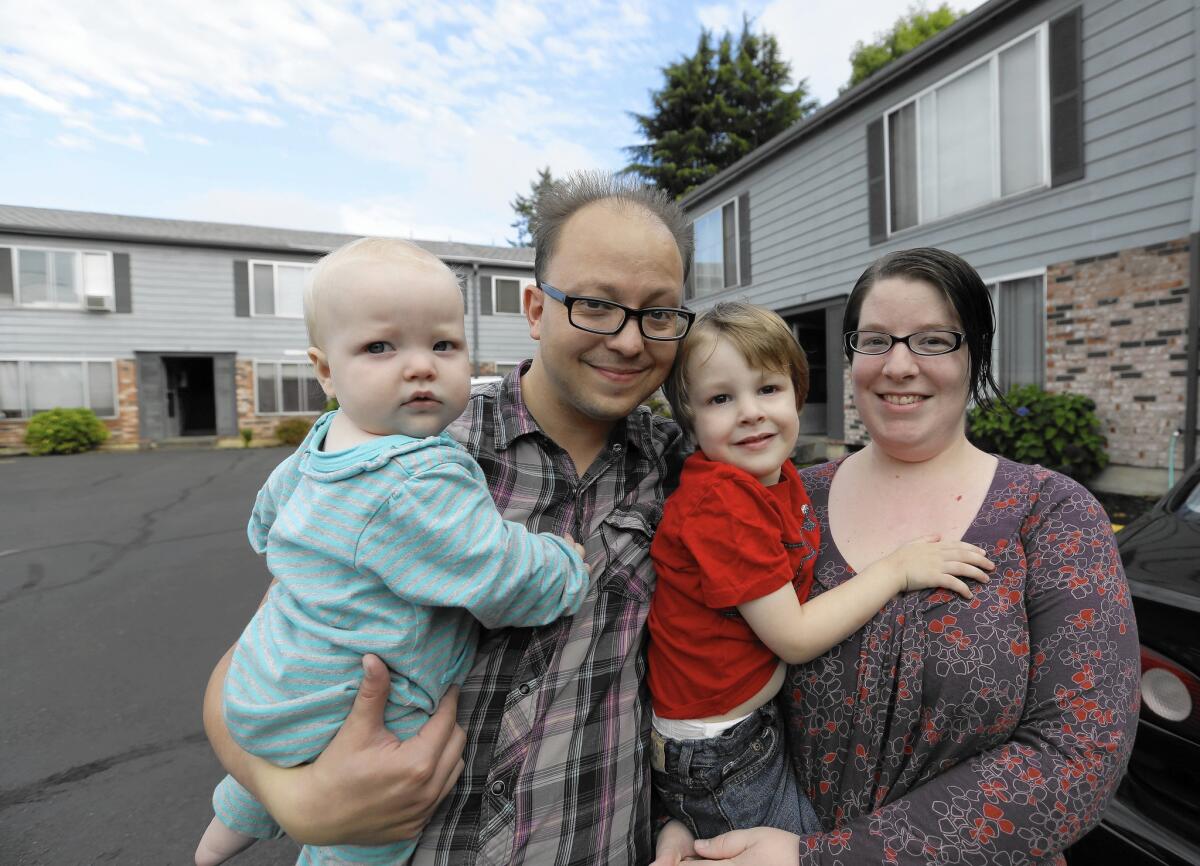Portland’s rents are driving out the artists who made it cool

Reporting from PORTLAND, Ore. — Portland has been a magnet for young, creative adults for more than a decade, beckoning droves with its quirkiness, liberal appeal and quality of life. But the city’s popularity has had another effect: Those who helped make it cool can’t afford to live here anymore.
Evictions and skyrocketing rents are putting apartments out of reach for many, especially those working part-time, low-wage or artistic jobs. It’s even harder to afford a house.
Some Portlanders are now looking for better-paying work. Some are giving up and leaving.
“It used to be you could live in Portland on a part-time job, pay your rent, pay your bills and be pretty comfortable,” said Steven Olsen, 31, who moved to Portland from Missouri nearly a decade ago.
Olsen had hoped to raise his two children in Portland because of its progressive values. He now works full time doing medical billing, and his wife works part time at Goodwill, but a recent $200 rent increase is forcing them to return to Missouri.
“I don’t really want to live in Missouri, but I also want to be able to eat,” he said.
Experts say there’s a national “shortage of cities” as people seek out hip, urban lifestyles.
Unlike previous generations, today’s college graduates younger than 40 — the nation’s largest demographic — are moving in droves to neighborhoods in San Francisco, Seattle or New York, Portland economist Joe Cortright said.
Companies are also increasingly setting up in or near city centers, offering well-paid jobs to those graduates, Cortright said.
As more people move to urban cores, they’re competing for a limited number of rentals. Housing construction is still lagging behind pre-recession levels, data show.
Incomes also have remained flat, so people at the bottom income rungs — the working poor, the disabled and the underemployed, such as artists and freelancers — are hit hardest.
Portland’s vacancy rate (about 3%) is one of the lowest in the country. The hot market has led some rents to double or triple, even in areas once considered less desirable, said Justin Buri of Portland-based Community Alliance of Tenants.
Entire apartment complexes are cleared out, the evictions followed by new owners renovating and increasing rents.
Some tenants, unable to find new rentals, have moved to hotels or doubled-up with family or friends, Buri said. Others face stress and depression as they’re forced to live far from their jobs and schools.
Susan Langenes and her husband, both professional musicians, lived for more than a decade in an apartment complex with other artists. They created a community: cooking, gardening and playing music together.
But last year, when their building was sold, the tenants received no-cause evictions. After new owners renovated the complex, Langenes said, rents tripled. She and her husband ended up in Milwaukie, a small town about five miles away.
To make ends meet, Langenes now works as a Web designer and plays gigs only occasionally.
The city she’s lived in for years has lost some of its friendly, creative culture, she said, and forced her to change too.
“That vision of Portland as a place where people can have the freedom to invent their own job and not have to fight the awful rat race to keep a roof over their head, it may be going away,” Langenes said. “It makes me sad.”
Sondr Engvaldsen, who moved from Vermont to study graphic design, had to find a new apartment on the city’s outskirts and take on a roommate after his rent doubled.
Engvaldsen, who at 39 calls himself an “aging creative,” said he’s considering leaving Portland.
“The do-it-yourself artist, I don’t think you have much of a chance of making a living here, unless it’s a side hobby,” he said. “It breaks my heart. I wasn’t planning to leave, but I’m scared I’ll be forced to.”
City officials say the construction of new multifamily housing will ease the crisis.
In the meantime, the Portland City Council approved rules that require landlords to give 90 days’ notice to tenants when evicting them without cause or raising rent by more than 5%. Previously, the requirement was 30 days’ notice in most cases.
Advocates are calling for a moratorium on no-cause evictions and for rent control, which is banned under state law. Cortright said rent control could make things worse for most people, except those who can score a rent-controlled home.
Raising wages — to $15 an hour or more — could help. But while higher incomes mean people have more money to bid on housing, it could push up rents even higher if supply is low.
The best solution? Experts say it’s shifting policies to make building housing easier. And accepting change, including the city’s popularity and the fact that adding higher-density housing can benefit everyone.
“People hate new development,” Cortright said. “But it’s the price of success.”
Wozniacka writes for the Associated Press.
ALSO
Hawaii struggles to deal with rising rate of homelessness
Researchers find origin of mysterious stone columns along Crowley Lake
El Niño ‘is here, and it is huge,’ as officials race to prep for winter
More to Read
Sign up for Essential California
The most important California stories and recommendations in your inbox every morning.
You may occasionally receive promotional content from the Los Angeles Times.










